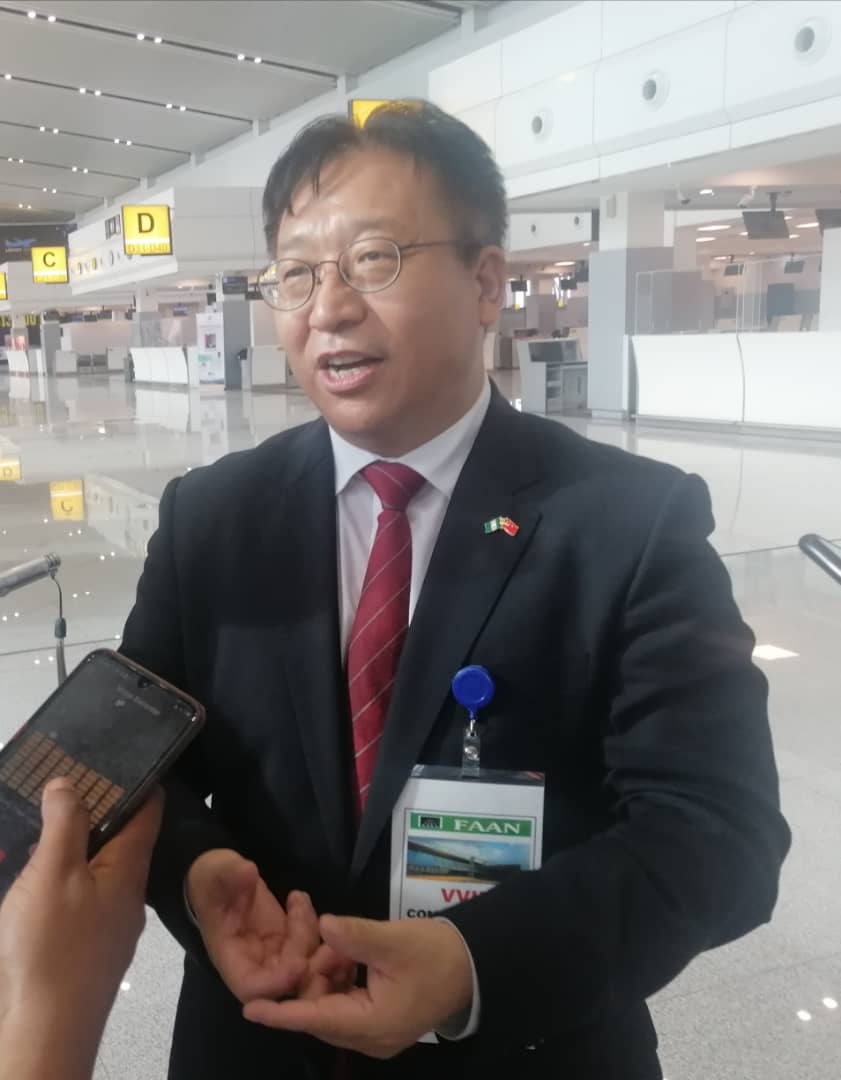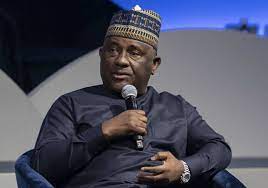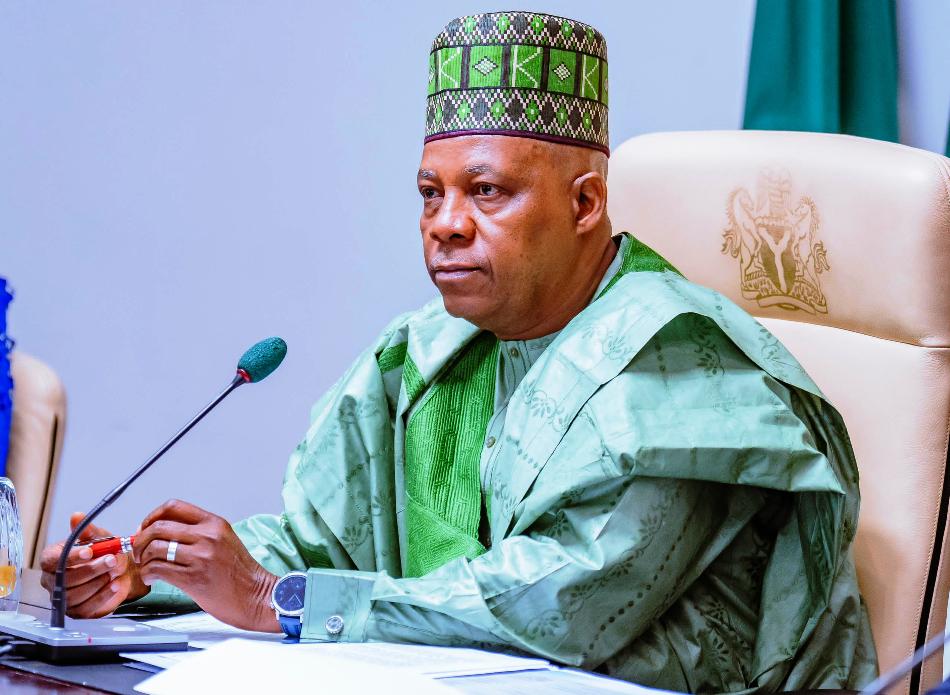..Chinese Ambassador to Nigeria, His Excellency Jianchun Cui
Over the years , Nigeria’s drive to improve critical infrastructure has pushed it to enter into partnerships with other countries and multilateral organisations. Significantly, the push has delivered new projects for Nigeria, including the newly commissioned international terminal at the Murtala Muhammed Airport, Lagos.
But, prior to the project’s delivery , the promoter, Chinese Civil Engineering Construction Company (CCECC) had described Lagos as the commercial capital and the country’s largest city, a world-famous hub, noting that the old terminal has been in use for 44 years, which made an upgrade necessary. The architectural acreage for the new terminal is 50,887 m². It is a multi-functional modern international airport including hotels, restaurants, and leisure.
The smooth launch of the new terminal will play an important role in promoting the economic prosperity of Lagos, reviving the economy of the city, the South West region, and Nigeria in epidemic control and healthy aviation operations, strengthening foreign trade, foreign cultural exchanges, and tourism development as well as enhancing the trade and tourist links between Nigeria and the world.
It would further help to shorten the geographical gap between the country and the rest of the world as the new terminal would be a new aviation landmark in Africa.
The Chinese Embassy had before the commissioning said that the ambassador to Nigeria, Mr. Cui had described the project as a typical footprint of the “Belt and Road,” which has added new momentum to the friendly economic and trade relations between China and Nigeria and has become another example of the in-depth development of China-Nigeria in infrastructure, economy, and trade.
A Nigerian who worked on the building of the new terminal explained that he is excited to see the project become a reality. He described the lobby as “spacious and bright, cool and comfortable; from the sight to the feel, it’s wonderful. The beautiful glass curtain wall, the modern facilities are world-class. It’s incredible that Nigeria has such a beautiful terminal, and I am looking forward to experiencing travel from here. Everything feels so perfect, like a dream.”
During the construction and implementation of the project, CCECC Nigeria said the project team surmounted many difficulties, such as the small site, requisition and relocation, large flow of human traffic day and night, and complicated underground pipe network.
However, through the measures of scientific planning, sectional construction, changing the pipeline network at nighttime, and the provision of temporary passenger paths, the team executed the project with “diligence, integrity, and perseverance” and overcome all the difficulties to ensure the smooth completion of the project.
During the construction process, the company insisted on taking root in the local area, building a talent training platform, cultivating a large number of outstanding talents for the local area, and helping to build a “China-Nigeria Community of Common Destiny.”
Speaking at the commissioning of the project, Chinese Ambassador to Nigeria , His Excellency Cui Jianchun spoke on the benefits of Nigeria and China relationship in improving infrastructure and other matters . Excerpts :
How will the new terminal impact the economy of Nigeria and what is the friendship between China and Nigeria?
We have done some evaluations and assessments about this project. It is very important for Nigeria because Lagos is a metropolitan city. So we have built this to international standards. With this state-of-the-art terminal, I believe we can attract more passengers to Nigeria. After COVID-19, countries are opening and people would like to come to Nigeria and travel out of Nigeria and they will do that through this gateway. Through this terminal, we can access the international community and people will benefit from this. This is a flagship project for China and Nigeria.
Which ways can China help Nigeria in actualising infrastructural renewal?
Nigeria is currently planning a huge railway project and we are working on this huge project. If we have a railway, it would be easy for people to travel and we are working on the pipeline. The challenge however is how we can get the money. How can we get reliable and reasonable terms of the finance? This is the challenge for us. But we are working hard and we are talking with the banks to do this for us. The banks are using their professional language. They are calculating the risks and how they can get the money back because we are in a difficult situation now. We are looking at how we can lift people out of poverty. During my speech at the commissioning of the terminal, I told the president that whatever the project, plan, policy, partners, the most important thing is the political support. So this is very important. The two countries from the top levels, from business levels, from people to people, from party to party, we need to work hard to build this trust. This will benefit the economy, security and international relationships.
With your experience in air transport and with what you have done in Nigeria, do you intend to replicate it in other countries and how will your investment in air transport spin development?
I have my personal understanding of Nigeria. We need a comprehensive, sustainable and systematic approach. Railway, highway, airport are key to migration. People cannot afford to buy tickets if there is no migration. How can we be productive by ourselves? There are five goals for two countries to work together. Political consonance, economic cooperation and international correlation and security and military collaborations and people to people communications. We are currently engaged in infrastructure development. The second is ICT. We need the digital economy, we need the 5G technology and also we need a value added industry. That means we can produce more commodities not only consumed by Nigerians but we can export to China. We need a value added industry to create jobs and to give people an income. We need to know how we can attract more foreign investment to Nigeria. We need to invest in agriculture, oil and gas industries amongst others. Foreign investments only rely on our domestic resources. So, we have to think of not only infrastructure but we have to think in a holistic way, which also involves the 5s. These include security, structures, speed, synergy and supervision. Nigeria has huge human and natural resources which is not what every country can possess. So we need the technology to aid production.
We need power so badly in the aviation sector, manufacturing sector, job creation amongst others. Do you have any plans to also invest in the power sector in Nigeria?
I was very disappointed this morning. I got up by 5am this morning and we tried to get a small airplane from Abuja to Lagos. We also booked a helicopter from the airport to Lekki. I could not fly there because there was no electricity. Power is the biggest challenge for Nigeria. This is very important for Nigeria. So, I am working hard to see what we can do. I am talking with the ministry about nuclear power. Nuclear power is not just about power. It is also about young people and technology. So, we have solar energy and oil and gas. We are working hard to bring some of these China investments here but we need a policy to support this because it is a long term investment. If we have this policy like we had in China, it will give us the time. But now, if we can only rely on domestic resources, we cannot make rapid progress. I have four generators in the embassy.
Hospitality and air travel are related. The Chinese government is also investing in the hospitality industry in Nigeria. What informed the drive to invest in the hospitality industry?
Nigeria is a beautiful country, with a nice landscape. People deserve to travel to a lot of places in Nigeria. We want to travel freely. Every year, we have 103 million people travelling out of China. I have talked to the ministry of information and culture to see if we can get only one percent of that number to visit Nigeria. That would mean 1.3million people from China can visit Nigeria yearly. This is possible. In the coming years, if security changes, tourism will boost in Nigeria. The Chinese love to visit Africa. We need investments to build tourism in Nigeria.






